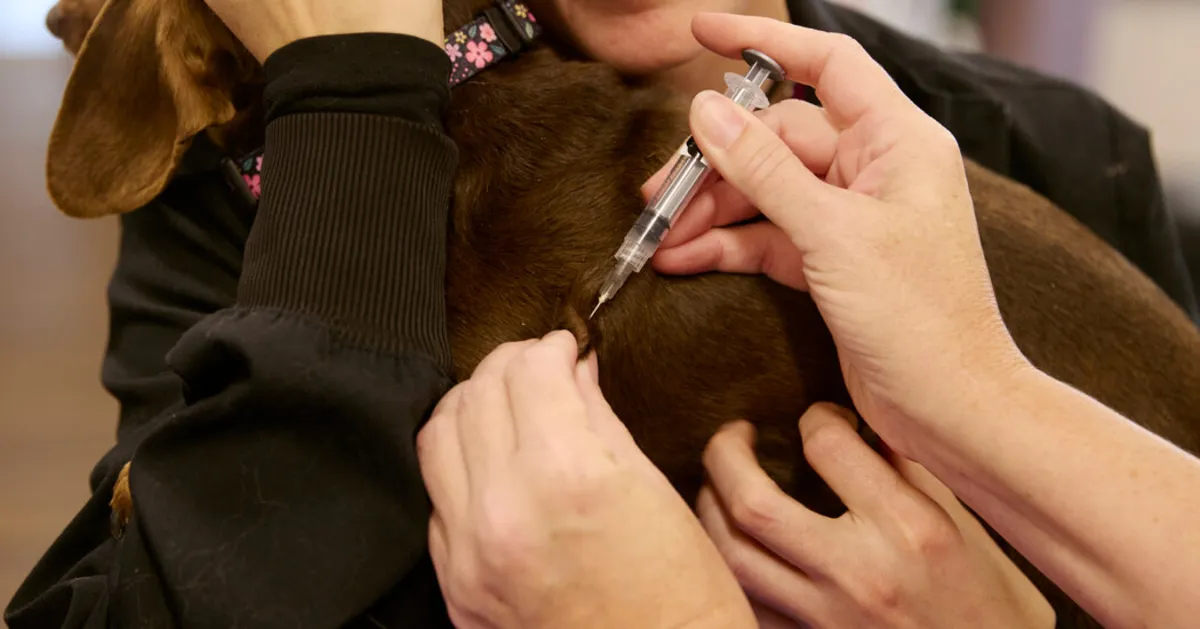
In the four years since she established Wildflower Veterinary Hospital in Brighton, Colorado, Dr. Kelly McGuire has encountered a series of heartbreaking cases that have tested her resolve as a veterinarian. Among these were dogs suffering from severe conditions such as kidney failure due to leptospirosis, a bacterial disease often transmitted by rodents. Tragically, several canine patients perished from acute cases of parvovirus, leading to severe dehydration and malnutrition. Moreover, Dr. McGuire faced the devastating decision to euthanize a 20-week-old puppy exhibiting seizures when she could not rule out rabies. The emotional toll of these preventable deaths is profound, especially knowing that proper vaccination could have saved these beloved pets.
For much of her career, vaccinations were a routine aspect of Dr. McGuire’s practice. However, the onset of the Covid-19 pandemic dramatically altered the landscape of pet healthcare. She began to experience increasingly lengthy and sometimes contentious discussions with pet owners regarding the safety and necessity of vaccines. Some clients accused her of promoting vaccines for profit, while others insisted on delaying vaccinations or outright refusing them, even for lethal and treatable diseases like rabies.
“I engage with thousands of veterinarians annually across the nation, and most are encountering similar issues,” stated Dr. Richard Ford, an emeritus professor at North Carolina State University College of Veterinary Medicine and a contributor to national vaccine guidelines for pets. Experts worry that this trend reflects the broader anti-vaccine movement seen in human medicine, potentially leading to a decline in vaccination rates and a resurgence of infectious diseases that threaten both pets and humans.
While precise data on pet vaccination rates in the United States is scarce, recent studies indicate a troubling trend. A 2023 survey revealed that 52 percent of pet owners expressed uncertainty regarding the safety, efficacy, or importance of vaccinations for their animals. Another study published in 2024 suggested that approximately 22 percent of dog owners and 26 percent of cat owners could be categorized as vaccine hesitant. This hesitancy is not surprising, given that many people view their pets as integral family members. “It’s understandable that they would draw parallels between human and pet vaccines, arriving at similar conclusions,” explained Lori Kogan, a professor specializing in human-animal interactions at Colorado State University.
Veterinary medicine is not immune to the influence of anti-vaccine narratives. Various anti-vaccine influencers have emerged, casting doubt on the safety and necessity of vaccinations for pets. In some instances, these fears are perpetuated by organizations associated with the human anti-vaccine movement, such as Children’s Health Defense, which has published materials claiming that annual vaccinations cause "tremendous harm" among pets.
Vaccine-hesitant pet owners often voice concerns similar to those found in the human anti-vaccine movement, including fears of over-vaccination, beliefs that natural immunity is preferable, and worries about potential cognitive or behavioral changes in pets post-vaccination, even linking it to conditions like autism. “The concept of ‘pawtism’ is circulating,” noted Dr. Brennen McKenzie, a California veterinarian and founder of SkeptVet, a blog focused on evidence-based veterinary practices.
While concerns about vaccine safety are prevalent, they are not entirely unfounded. Early formulations of the leptospirosis vaccine were associated with a heightened risk of severe allergic reactions, particularly in small dogs. Cats, too, can develop injection-site sarcomas, a rare form of cancer, as a result of vaccinations. However, the incidence of these serious side effects has significantly decreased in recent years due to advancements in vaccine formulations and refined vaccination protocols. Current guidelines suggest that many vaccines now require boosters every three years instead of annually.
“There has been considerable evolution in vaccination practices over the past two decades, reflecting our ongoing commitment to improving safety and efficacy,” Dr. McKenzie remarked. Overall, experts suggest that vaccine-hesitant pet owners tend to overestimate the risks associated with vaccines while underestimating the dangers posed by infectious diseases. This parallels the challenges faced by pediatricians, as the success of vaccinations has led many pet owners to underestimate the severity of diseases like rabies and parvovirus.
Recognizing the similarities between the challenges in veterinary and pediatric medicine, Dr. McGuire connects with a network of veterinarians and pediatricians to share experiences and strategies for addressing growing vaccine hesitancy. “We often express our fatigue from having repetitive conversations with pet owners,” she said. “Ultimately, our goal is to protect the health of dogs and cats.”